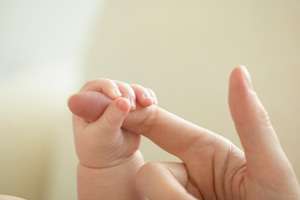Hepatitis B exposure trains newborns' immune cells, enhancing their ability to respond to pathogens

Exposure to Hepatitis B virus (HBV) in utero can help 'mature' a human neonatal immune system and may improve the capacity of human neonatal immune cells to respond to secondary infections, an international research team has shown.
Chronic infection with HBV affects approximately 300 million people worldwide and can lead to liver disease, cancer, and death. Transmitted via blood or bodily fluid, the virus is most commonly spread from mother to child, especially in Asia. Mother-to-child transmission often leads to chronic infection and, based on evidence from mouse models, is thought to be associated with an 'immunotolerant' state in newborns.
This study suggests that HBV may behave differently in humans than it does in mice. "HBV does not infect mouse liver cells, therefore the significance of mouse models in relation to HBV pathogenesis is questionable," notes Michelle Hong from the A*STAR Singapore Institute for Clinical Sciences. The 'immunotolerance' hypothesis is also undermined by the high success rate of neonatal HBV vaccinations; backed up by the recent finding that chronic HBV-infected young adult patients, clinically labeled as 'immunotolerant', have a normal immune response.
Hong, along with Antonio Bertoletti, and colleagues from Singapore, Italy and the UK examined the immune cells in the umbilical cord blood of newborns to see whether HBV exposure in utero alters immune response. "Contrary to current belief, infants exposed to HBV are not immune-tolerant but they have more mature immune systems," she says, "we were able to detect more activated innate and adaptive immune cells, and a stronger immune response upon unrelated bacterial challenge in a process called trained immunity."
"In trained immunity, the first stimulus/infection acts like a 'trigger' that primes the innate immune response," explains Hong. "While this declines rapidly after the infection, it often remains above basal levels. When exposed to a second stimulus—either the same pathogen or a different one—you have a much stronger innate immune response."
"We suggest that HBV exposure in utero confers a selective advantage to these babies to counteract a second infection during their early years."
Hong notes this dual role of HBV was a surprising discovery, "HBV is pathogenic in later adulthood but during the early years it seems to be protective in a sense, since it confers some benefits to the host."
Hong and colleagues are now studying the immune response in chronic HBV-infected pediatric patients, "The ages between two to 12 years is a 'black box': it's not really clear what happens during this early stage of infection," she says.
More information: Michelle Hong et al. Trained immunity in newborn infants of HBV-infected mothers, Nature Communications (2015). DOI: 10.1038/ncomms7588



















